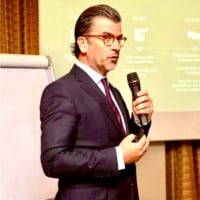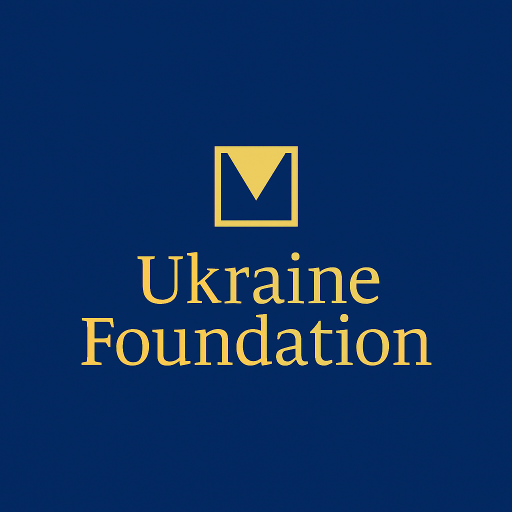Ukraine Foundation
Inspiring Change, Driving Impact
Pr. João Pedro Gonçalves is an accomplished economist and international advisor with over 25 years of high-level experience across academia, government, multilateral organizations, and the private sector.

Pr. João Pedro Gonçalves serves as Executive Economic Advisor to a government entity of the Kingdom of Saudi Arabia and as a Financing for Development Expert with the United Nations Department of Economic and Social Affairs.
Since 2023, he has worked with the United Nations Development Program (UNDP) in roles including Lead Sustainable Finance and Innovative Finance Advisor, and Lead Economic Advisor, with prior advisory tenures in Central Africa, the Middle East, and Sub-Saharan Africa.
Previously, João Pedro Gonçalves held senior leadership roles such as Chief of Mission at the African Development Bank, Lead Economic Advisor to the Government of Abu Dhabi, and Chief Economist or Lead Advisor to sovereign wealth funds and central banks in Brazil, Angola, Bahrain, Timor-Leste, and Saudi Arabia. His landmark achievements include leading Uzbekistan’s first Green Bond and the first Sovereign SDG Bond issuance.
In the private sector, he served as Chief Economist and CIO at Global Wealth Management in Zurich, and as Senior Economic Advisor at Dun & Bradstreet in London. He began his financial career managing capital markets at Abanca in Spain and Portugal.
As a professor since 1999, João Pedro Gonçalves has taught Economics, Finance, and Public Policy at the Catholic University of Portugal (including roles as Dean and Dean Advisor), and at the University of Minho. He held visiting positions at institutions including the London School of Economics, University of Rome ‘Tor Vergata’, University of Barcelona, Mikolas Romeris University in Lithuania, and universities in China, Angola, and Kuwait.
His extensive advisory engagements include collaboration with BCG, McKinsey, PwC, EY, KPMG, Deloitte, and Bain & Co, supporting national strategies across the GCC, Africa, Latin America, and Southeast Asia on sustainable development, macroeconomic policy, social protection, trade, education, ESG, and investment.
He has contributed to numerous confidential and institutional reports for the UN, development banks, sovereign funds, and global consulting firms. He is a frequent author of strategy and policy documents on SDG finance, macroeconomic frameworks, shadow economy measurement, green investment, and international development policy.
Pr. João Pedro Gonçalves pursued doctoral studies in Economics, Finance, and Public Policy at the University of Minho, Catholic University of Portugal, and University College London. He holds multiple master’s degrees in Business Economics (Oxford), Higher Education Policy (Oslo), Finance (Lancaster), and International Relations (Oxford), among others. His undergraduate studies include degrees in Economics and International Business.
He has also undertaken extensive executive and specialized training at institutions such as University of Oxford, INSEAD, and University College London (CEMMAP), and has completed programs in national defense and crisis management.
He is a native speaker of Portuguese and Spanish, fluent in English and French, and proficient in Italian.
Berlin and Kyiv: On 24 July 2025, Ukraine Foundation and the Professional Government Association of Ukraine co-hosted an Expresso online session with Professor Theocharis N. Grigoriadis, our Distinguished Senior Fellow for Eastern European Affairs and Economics. The event, “Political Economy of Food Security: Evidence from Ukrainian & Russian Wheat Exports to Africa”published with the Kyiv School of Economics, Free University Berlin, and the European University of Viadrina.

Presenting his groundbreaking study co-authored with Pavlo Martyshev, Oleg Nivievskyi, and Ivan Kolodiazhnyi under the auspices of the Kyiv School of Economics, Free University Berlin, and the European University of Viadrina, Professor Grigoriadis discussed new evidence on the dynamics of grain exports and their geopolitical implications. He highlighted how the full-scale war in Ukraine has disrupted global food supplies, with Africa—heavily dependent on Ukrainian and Russian wheat—emerging as a focal point in the weaponization of grain trade.
The presentation unpacked the political and economic strategies at play in the global wheat market and emphasized what Ukraine must do to restore competitiveness while countering Russia’s manipulation of food insecurity as a geopolitical tool. Participants engaged with Professor Grigoriadis in an interactive Q&A, exploring practical ways for policymakers, agribusiness leaders, and researchers to address vulnerabilities in food security.
This session pursued our joint Expresso series with the Professional Government Association of Ukraine and underscored our commitment to advancing rigorous, policy-relevant research that not only addresses Ukraine’s challenges but also contributes to solving critical global issues at the intersection of economics, security, and geopolitics.
About Pr. Theocharis Grigoriadis
Professor Theocharis N. Grigoriadis holds the W-2 Professor position with tenure at Freie Universität Berlin’s Department of Economics and Institute of East European Studies, where he has served since 2014.
A prolific researcher, Professor Grigoriadis has authored over 40 peer-reviewed articles in leading journals including the Journal of Economic History, European Economic Review, Journal of Conflict Resolution, and China Economic Review. His research spans diverse topics from the political economy of religious institutions to energy economics, climate change, and regional development. His book “Religion & Comparative Development: The Genesis of Democracy & Dictatorship” (Edward Elgar, 2018) exemplifies his innovative approach to understanding the deep historical roots of modern economic and political systems.
Currently, he is completing two major monographs: “Muscovy as New Byzantium: Imperial Political Economies & Orthodox Systems in Ivan IV. the Terrible” and “Spies & Revolutionaries: Imperial Russia’s Foreign Intelligence & the Defense of National Security,” which demonstrate his expertise in Russian imperial history and its contemporary relevance.
Professor Grigoriadis has secured over €1.5 million in competitive research funding from prestigious agencies including the German Research Foundation (DFG), German Academic Exchange Service (DAAD), and the European Commission. He serves as Program Director for multiple international partnerships, including the “Integrated Master of Science in Economic Systems” with the University of Belgrade and various German-foreign university collaborations spanning Russia, Ukraine, Georgia, Uzbekistan, and other Eastern European nations.
His extensive international network includes affiliations with the Hellenic Foundation for European & Foreign Policy, American University of Beirut, and research fellowships at Stanford’s Hoover Institution and Sabancı University’s Istanbul Policy Center. He has supervised over 150 completed theses at bachelor’s, master’s, and doctoral levels, mentoring the next generation of scholars in economics and area studies.
Beyond academia, Professor Grigoriadis contributes to policy through advisory roles with international organizations including the Open Society Foundations and UN Economic & Social Commission of Western Asia. His expertise in energy economics, climate policy, and post-conflict development has informed policy discussions from the Middle East to Central Asia.
Professor Grigoriadis holds multiple doctoral degrees from leading institutions: a PhD in Political Science from UC Berkeley (2012), a PhD in Economics from Saint Petersburg State University (2012), and is currently completing a PhD in Slavic Literatures and Cultures at Humboldt Universität zu Berlin. His educational foundation includes an MA in Russian and East European Studies from Yale University (2005) and an LLM from the University of Athens (2007). This interdisciplinary background uniquely positions him at the intersection of economics, political science, and cultural studies.
Fluent in eight languages including Greek, English, German, Russian, and Ukrainian, Professor Grigoriadis embodies the international perspective essential for understanding complex economic transitions and development patterns across cultures and political systems. His work bridges rigorous quantitative analysis with deep historical and cultural understanding, making him a leading voice in comparative economics and the study of institutional development in transition economies.
The discussion was moderated by Dr. Kostiantyn Lisnychyi.
Milan: Natalie Shkarban At Ukraine Recovery Conference’s Milan Preparatory Business Forum

On 5 March 2025, Milan hosted the pivotal “On the Road to URC 2025” business forum, marking a significant milestone in the lead-up to the Ukraine Recovery Conference (URC) scheduled for 10–11 July in Rome. This preparatory event convened over 550 representatives from 23 countries, including government officials, international financial institutions, and private sector leaders, to strategize Ukraine’s post-war reconstruction and economic revitalization.
Keynote speakers included Ukrainian Prime Minister Denys Shmyhal (via video message), First Deputy Prime Minister Yuliia Svyrydenko, Italian Foreign Minister Antonio Tajani, and Lombardy Region President Attilio Fontana. Their addresses underscored the urgency of mobilizing international investment and fostering public-private partnerships to rebuild Ukraine’s infrastructure, energy systems, and industrial base.
Discussions at the forum focused on several strategic areas:
• Investment and Financing: Exploring mechanisms to attract foreign capital, including risk insurance and government incentives.
• Energy Resilience and Green Transition: Promoting sustainable energy solutions and the development of a green energy system in Ukraine.
• Industrial Production and SMEs: Enhancing local manufacturing capabilities and integrating Ukrainian small and medium-sized enterprises into global supply chains.
• Infrastructure and Housing: Reconstructing critical infrastructure and providing housing solutions for internally displaced persons.
The event also highlighted collaborative initiatives such as the partnership between Lombardy and Zaporizhzhia regions and the presentation of a master plan for Mykolaiv’s recovery.
This Milan forum set the stage for the upcoming URC 2025 in Rome, which aims to consolidate international support and secure tangible commitments for Ukraine’s reconstruction efforts.
FAQs
What is the focus of Ukraine Foundation’s work?
Ukraine Foundation is an independent, mission-driven research and impact organization dedicated to advancing peace, resilience, and innovation in Ukraine. Our work combines rigorous policy research with practical initiatives that strengthen Ukraine’s international partnerships, support innovation and technology, and promote cultural resilience amid the ongoing war.
How does the Foundation turn research into impact?
We believe research should lead to real-world change. Our policy programs —Ukraine in Europe, China in Ukraine, and Ukraine in the Global South— produce insights that shape international dialogue and policy. At the same time, our impact initiatives foster cooperation between governments, businesses, academia, and civil society, ensuring that ideas translate into action for Ukraine’s security, prosperity, and influence.
How can individuals and organizations engage with the Foundation?
Engagement is central to our mission. Partners, experts, and supporters can collaborate through joint research projects, public events, and strategic initiatives in innovation and culture. We also welcome contributions to our programs that amplify Ukraine’s voice globally and strengthen its resilience at home.
How can I support Ukraine Foundation?
You can support our mission by contributing financially, partnering on research or impact projects, or amplifying our work through your professional networks. Every contribution -whether funding, expertise, or visibility- helps us strengthen Ukraine’s resilience and global partnerships.
Does Ukraine Foundation accept volunteers or research fellows?
Yes. We welcome dedicated professionals, researchers, and students who want to contribute to our policy and impact agenda. Opportunities range from short-term projects and fellowships to longer-term engagement with our programs and initiatives.
How can organizations collaborate with the Foundation?
We actively partner with think tanks, universities, governments, businesses, and NGOs to co-develop research, host events, and implement projects that drive meaningful change. Organizations interested in collaboration can reach out to us directly to explore tailored partnerships.
